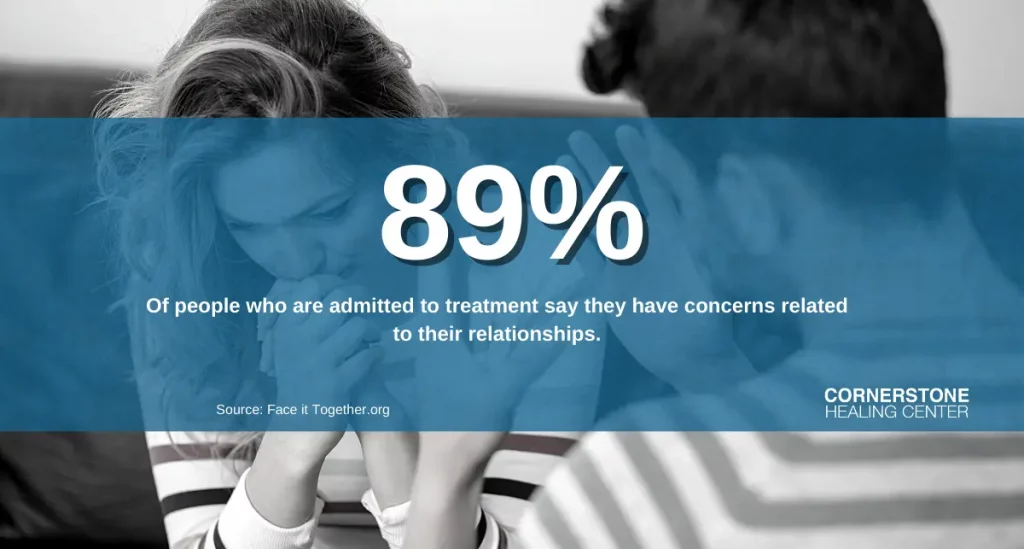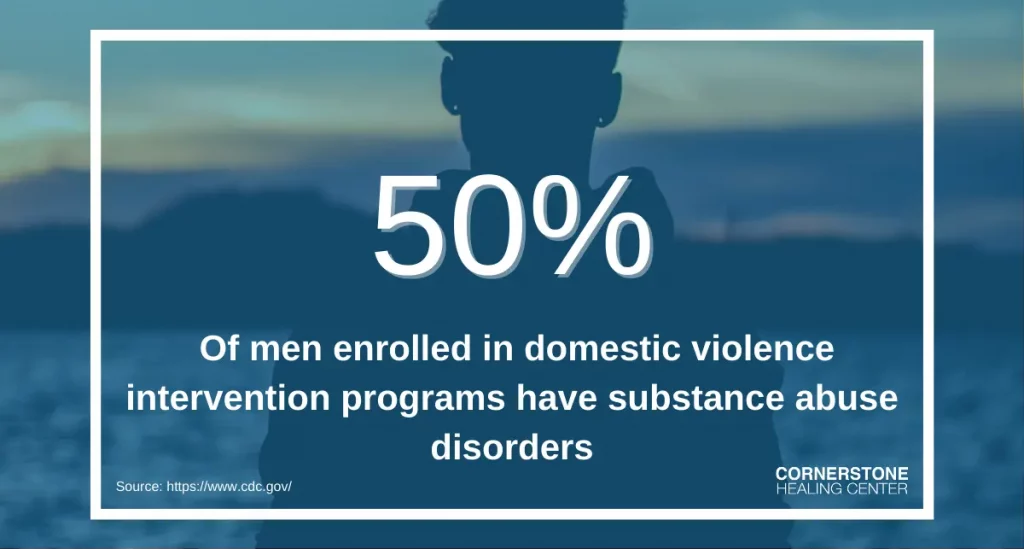Listen to the article audio:
The Importance of Understanding the Complexities of Addiction
Addiction is a complex and multi-faceted phenomenon that can have significant impacts on relationships of all kinds.
When someone is struggling with an addiction, it can cause them to prioritize their substance use over other important aspects of their life such as relationships. This can lead to conflict within the relationship and feelings of neglect and betrayal.
In some cases, the addiction will even put the safety and well-being of those involved in the relationship at risk.
The effects of addiction are not limited to just romantic relationships; it can also profoundly impact family dynamics and friendships.
For example, family members may be forced to take on more responsibilities or may feel obligated to clean up after the addicted person’s messes.
Friendships can suffer due to lack of communication or trust and an increasing amount of resentment and frustration related to the addict’s behavior.
Understanding how addictions affect relationships is important for anyone who has a loved one struggling with addiction or those trying to help someone else through this difficult time.
It’s important that we don’t blindly blame or judge individuals with addictions. More often than nit, underlying issues such as mental health problems or trauma need to be addressed for real progress in recovery from addiction to be made.
Being supportive and providing resources for people with addictions can go a long way in helping them begin their journey towards lasting recovery.
Addiction Affects Trust
Trust is a cornerstone of any healthy relationship, and addiction can severely impact it. People affected by addiction often resort to lying and manipulation to cover up their behavior and get their fix.
This can lead to a lack of trust between partners, as one or both may feel they cannot rely on the other to be honest and forthcoming.
In some cases, the person with addiction may become paranoid that their partner or family members are “out to get them, ” which can lead to further problems.
In addition, people with addictions often withdraw from their relationships to focus on their addiction, leaving partners feeling neglected and unloved.
This can create a sense of resentment and bitterness, further damaging the relationship.
The person with addiction may also become aggressive or violent when challenged about their behavior, leading to arguments and further damaging trust in the relationship.
Finally, people struggling with addiction often experience guilt and shame over their behavior. This can create a wall between them and those they are closest to, making it difficult for the relationship to move forward.
Manipulative Behavior that Addiction Causes
People with addiction often resort to manipulation to get their fix. This can include lying, coercion, and even threats. This manipulative behavior can damage the relationship drastically by creating a lack of trust between partners and family members.
In some cases, people with addiction may even attempt to manipulate their loved ones into enabling their bad behavior by guilt-tripping or using emotional blackmail.
This type of behavior can also lead to arguments and resentment within the relationship, as one or both partners may become frustrated with the manipulative tactics used by the person struggling with addiction.
Furthermore, this type of behavior can damage both parties involved as it encourages a lack of accountability for their actions.
Isolation and Disconnection Because of Addiction
Addiction can cause a person to become increasingly isolated from those closest to them.
As the addiction progresses, the person may begin to withdraw from relationships to focus on getting their fix, leaving partners and family members feeling neglected and abandoned.
This can lead to feelings of loneliness and resentment within the relationship, damaging trust and connection between partners.
In addition, people struggling with addiction may become hostile or aggressive when confronted about their behavior. This can lead to arguments and cause one or both partners to feel unsafe.
Furthermore, this type of behavior can create a disconnect between the couple as communication breaks down and trust is eroded.
Finally, addiction can also cause people to become distant and withdrawn even when they are not using the substance or engaging in the behavior.
This can create a disconnection between partners as one may feel that the other is never truly there, leaving them feeling lonely and unsupported.
Addiction Causes Financial Issues in Relationships
Addiction can severely impact finances, as people with addiction may spend large amounts of money on their substance or behavior of choice.
This can leave partners and family members feeling financially insecure, especially if they are the ones paying for the addiction without knowing it.
In addition, people struggling with addiction often resort to lying or manipulation in order to get more money for their addiction, which can lead to financial and emotional strain within the relationship.
Furthermore, addiction can cause people to lose their jobs due to poor performance or absenteeism, leading to an even greater financial burden.
This can create great stress in the relationship as both partners may struggle financially while trying to manage the addiction.
Codependency
Addiction can lead to codependency issues in relationships. This can occur when one partner takes on the responsibility of caring for and protecting the other partner from the consequences of their addiction.
This often leads to one person feeling overburdened and frustrated as they try to manage both their own life and that of their addicted partner.
In addition, the codependent partner may feel guilt for not being able to fix their partner’s addiction, leading to resentment and frustration.
The codependent partner may also become overly controlling in an attempt to keep their partner from using or engaging in the addictive behavior, which can further damage the relationship.
Enabling
Addiction can also lead to enabling in relationships. This occurs when a partner or family member allows the person struggling with addiction to continue their behavior without facing any consequences.
This type of behavior often occurs out of fear or guilt and can make it more difficult for the addicted person to recognize the negative impact that their addiction is having on them and their relationships.
Furthermore, it can create a cycle of codependency in the relationship as the partner becomes increasingly dependent on the other for financial and emotional support.
I couldn't believe it, but it got to the point where I was physically lashing out and hurting my family. It was nothing like me but I couldn't control the impulses to get violent when using drugs.
Anonymous Person in Recovery
Violence
Unfortunately, addiction can also lead to violence in relationships. This can occur when the addicted person becomes aggressive or violent while under the influence of their substance or behavior of choice.
Furthermore, arguments and verbal abuse may arise due to financial difficulties or disagreements about addictive behavior. This behavior can leave both partners feeling unsafe and even more disconnected from one another.
Mental Health Struggles
Addiction can also have a serious impact on mental health in relationships. Having to deal with outbursts, violent behavior, stealing, and manipulation can be incredibly tiring. The difficult situations cause intense issues for friends and/or family members of the addicted person, who often struggle with guilt, depression, and anxiety due to their loved one’s addiction.
Furthermore, addiction can lead to a breakdown in communication, making it difficult for both partners to express their feelings or work through conflicts.
This can lead to an even greater disconnection between the partners and can ultimately cause further damage to the relationship.
How to Get Help if Someone You Love is Addicted to Drugs or Alcohol
If someone you love is struggling with addiction, it is important to reach out for help. You can start out by reaching out to us here are Cornerstone Healing Center at (888) 583-3480. Our addiction treatment programs can provide the necessary support and resources for both the addicted person and their family members or partners.
Therapy can be beneficial for helping couples work through any negative feelings that may have arisen due to the addiction.
Finally, support groups such as Alcoholics Anonymous and Narcotics Anonymous can provide a safe space for both the addicted person and their loved ones to work through their struggles.
With help, it is possible to heal from addiction and save a relationship.
SOURCES
[2] Substance Abuse and Intimate Partner Violence
Published: 1/11/2023




